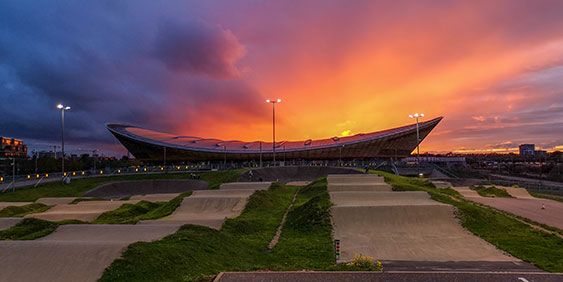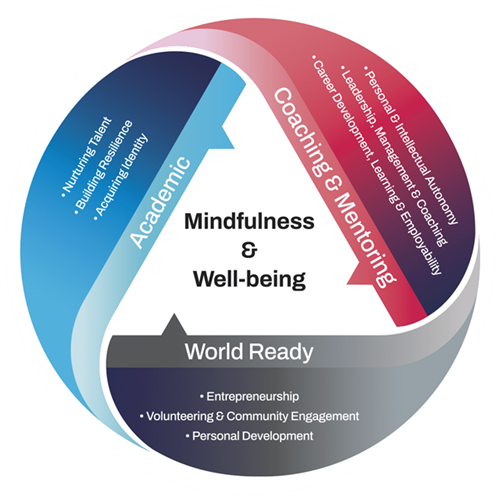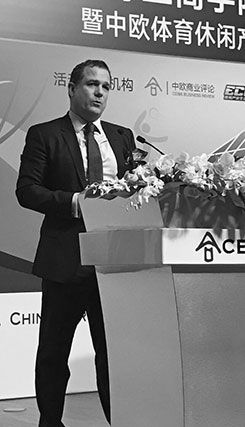Building a world-ready graduate
)
 The College of Esports is a very new institution. Where did the concept of this institution come from?
The College of Esports is a very new institution. Where did the concept of this institution come from?
Over the last couple of years, we've been looking at the world of esports and gaming and trying to create a model of success for students. It's a multi-billion-dollar, global supply chain industry, and while it encompasses lots of traditional subject areas it's also a new frontier in terms of careers, technology and entertainment. We decided to create something that would cater for this sector specifically ' of course, you can do degrees in digital marketing or media already, but for us, it's a case of teaching essential skills for the future workplace by leaning into a new cultural phenomenon.
'
What is the TRI-Curriculum, and how was it first developed?
We wanted to create a cultural melting pot where people of like minds, from both industry and academia, can come together and explore a sector which is constantly transforming. We wanted to develop a curriculum that supported students in building a portfolio of skills that they can lean on when competing with other candidates for jobs of the future because our goal is to start working on a student's exit strategy and personal brand from their very first day on campus.
So, our TRI-Curriculum is split into three essential factors which build a holistic 360-degree experience of immersive education. The first is Academic, which means that our credit-bearing modules are delivered within the recognised university frameworks. The second is Coaching, where we bring in mentors from the industry to deliver cross-functional teaching and experience sessions. The third is World Ready, which represents a large range of personal development opportunities. We want people to live, learn and work in the machine with the industry. You listen in the classroom, you read around it through learning resources, and you then go out into the real world and you put your theories into practice. And student wellbeing is the thread that ties all of these strands together and makes each part of the TRI-Curriculum work.
What is the significance of mindfulness and well-being in the TRI-Curriculum?
 One of the things I've learned over my years as an educator is that the things that derail students are rarely the academic side of things ' it's feelings of anxiety and life challenges that can sometimes become exacerbated when students find themselves living away from home for the first time. We place mindfulness and wellbeing at the very centre of the TRI-Curriculum for several reasons that relate directly to the student experience ' the first is about looking after the human being. When starting Higher Education students are often still developing the maturity and emotional resilience; they need to tackle challenges like these on their own. This is particularly evident after the pandemic when COVID has stripped away many of the experiences that students usually would have had and that would have moved them along on their maturing journey.
One of the things I've learned over my years as an educator is that the things that derail students are rarely the academic side of things ' it's feelings of anxiety and life challenges that can sometimes become exacerbated when students find themselves living away from home for the first time. We place mindfulness and wellbeing at the very centre of the TRI-Curriculum for several reasons that relate directly to the student experience ' the first is about looking after the human being. When starting Higher Education students are often still developing the maturity and emotional resilience; they need to tackle challenges like these on their own. This is particularly evident after the pandemic when COVID has stripped away many of the experiences that students usually would have had and that would have moved them along on their maturing journey.
The second reason for our focus on well-being and mindfulness is the importance of knowing how to self-regulate in today's world. We're very focused on building space into the campus to allow for decompression ' for example, spaces which have no mobile devices, soft lights, appropriate background music and appropriate furniture which encourages students to take a step back from immediate daily stresses. We build multiple opportunities into the curriculum to help students learn about different techniques and approaches to managing their mental health, whether that's through various yoga, therapy or mindfulness. Students have a much better chance of being successful, both during their time in education and later in the workplace, if they can use some of these tactics and skills. That's what we mean by an immersive education experience ' it's not just about getting students through three years of academic study, but by helping students develop emotional resilience and self-awareness.'
What does a world-ready graduate look like?
It's hard to know because the goalposts are always moving. A big piece for us is making sure students get a level playing field from a digital point of view, so making sure everyone leaves Higher Education with the relevant digital literacy to be able to succeed in the workplace of the future. But there's the other side of the coin which is the soft skills, things like digital media and the softer human skills. We have mentors who come in from some of the bigger broadcasters to explore things like digital footprints. Students need to be aware of the role that the internet plays in creating their brand ' an interview with a broadsheet is very different from a red-top or a blog; live television is very different from doing an edited piece on a digital media channel. So we bring people in who can speak to those essential straight from the industry perspective. Students need to think about so much more now in order to succeed in the workplace, especially when the digital comes into play.
What role does wellbeing play in building a world-ready graduate?
The world is a fast-paced and complex environment that can take years to begin to understand and deal with the many variables and challenges. Whilst we cannot be with every student in-person every day of their entire life, our central cultural approach is to provide students with multiple coping skills and strategies with a high level of personal awareness of what self- skills to use and when. If we can equip our students with these core skills, it will increase their mental and emotional resilience and thus the ability for them to excel in all of their tasks, both personal and professional. This will greatly benefit the student but also employers, who will have students from our institution that are positive, creative, empathetic, balanced and resilient to contribute and provide a positive impact on their organisation.
In addition, all of our graduates upon becoming part of our alumni will continue to have the ability to access and engage with our wellness activities if they need support throughout life. Our mantra is that whilst a student may be with us for an initial three or four years, they are part of our institution for their entire life.
How is Esports disrupting Higher Education?
I think it comes back to the TRI-Curriculum approach. Higher Education is one of the most regulated sectors globally, and rightly so. It takes years of stress-testing and checking before you can release a degree to the outside world. The TRI-Curriculum allows us to work complementary to the regulatory restrictions and allows both staff and students to explore the world in real-time across contemporary subjects. We have to be so reactive ' in the real world, international business changes every week, digital marketing changes every day, and esports is so complex that it's almost a fluid concept. In more traditional subjects it can take 18 months to put your research out in a journal or book, but the global world of esports is such a high-velocity subject.
In Higher Education, we have a process called research-informed teaching; taking and assimilating knowledge to deliver to students. Due to the nature of several components of our curriculum, we have had to create a new approach that I entitle "just-in-time research-informed teaching". Utilising a tried and tested process methodology from other sectors and bringing it into Higher Education. We bring in academics from multiple different sectors who can work in that fluid disruptive environment ' if something happens in the world of esports and gaming at 8 am, students will know about it and expect lecturers to consider it during their 10 am lecture that same day. We need academics who are prepared to work in that way and engage with different teaching models which we have to employ due to the nature of the velocity of the subject.
It's also a case of harnessing the attention of the student cohort and making sure they're truly engaged in the subject content. After football, esports and gaming are the most-watched and participated sports. So, for someone who wants to do a degree in digital marketing, but is passionate about gaming and esports, we can combine those essential skills with subject matter that really grabs their interest. And working in such a vibrant and fast-paced sector helps give students a better outlook on the future. I think in the past we've been too predisposed to view change as a threat ' today's students have the aptitude to see change as an opportunity.
'
 Professor Philip Wilson'has been involved in the leadership and creation of several high-profile boutique university-level institutions, such as University Campus of Football Business (Co-Founder & Chief Executive), Chief Executive at Conde Nast College (part of the group that owns Vogue, GQ etc) and a Group Chief Executive at Global University Systems (85,000 students across multiple universities).
Professor Philip Wilson'has been involved in the leadership and creation of several high-profile boutique university-level institutions, such as University Campus of Football Business (Co-Founder & Chief Executive), Chief Executive at Conde Nast College (part of the group that owns Vogue, GQ etc) and a Group Chief Executive at Global University Systems (85,000 students across multiple universities).
Philip also sits on the Board of the UK Quality Regulator for universities, namely the Quality Assurance Agency, as well as Advisory Committee for Degree Awarding Powers.
Away from Higher Education, he is on the Board of British Wheelchair Basketball, Sport Liverpool Board and Burnley Football Club (Community Trust).
The College of Esports is the vision of two founders ' Professor Philip Wilson and David Thomson ' both of whom have a lifetime of experience in Higher Education and the global sports industry. You can find out more, including September enrolment deadlines, on'their website here.


)
)
)
)
)
)
)
)
)